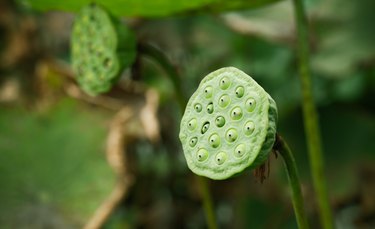
The lotus flower is symbolic in many cultures. In Buddhism, the lotus represents purity as well as desire. In traditional Chinese medicine, every part, including the seed, which is also known as the lotus nut, is used for healing purposes. Therefore, it is a symbol of health and harmony.
The lotus flower is also important in Indian, Egyptian and Japanese cultures. Across many cultures, the lotus plant symbolizes values like fruitfulness, rebirth, spirituality and enlightenment.
Video of the Day
Video of the Day
Aside from its many symbolic meanings, lotus seed nutrition and lotus seed benefits are also factors that make this plant so highly regarded. Inside the plant are lotus seeds; a seed is also known as a lotus nut. They are the part of the plant that is associated with health benefits.
What Are Lotus Seeds?
Lotus seeds — aka lotus nuts — are the seeds of the lotus plant Nelumbo nucifera. The lotus plant also goes by the names Chinese water lily, sacred lotus and Indian lotus. It is often referred to as not only an edible plant, but also a medicinal plant.
The lotus plant and its seeds are commonly consumed and utilized for medicinal purposes across many countries in Asia. It is growing in popularity in places like Australia and America where there is budding interest in alternative or holistic medicine and the healing properties of various plants.
According to a June 2016 study published in Frontiers in Plant Science, the entire lotus plant is edible and beneficial, but the lotus seeds benefits are especially noteworthy. The study states that the lotus seeds are known for their flavonoid content and alkaloid content. These metabolites are capable of antioxidant, anti-amnesic, anti-inflammatory, and anti-tumor activities.
Read more: The Right Serving Size for Nuts and Seeds
Lotus Seed Nutrition
According to the USDA, a 1-ounce serving of raw lotus seeds contains the following nutrients:
- 25.2 calories
- 1.17 grams of protein
- 0.15 grams of fat
- 4.9 grams of carbohydrates
The lotus seeds nutrition facts also include insignificant amounts of vitamins and minerals, including calcium, iron, potassium, magnesium and zinc.
Unlike many seeds, lotus seeds are not significant sources of fat or fatty acids. Nuts and seeds are usually credited for being plant-based sources of omega-3 fatty acids. However, lotus seed nutrition facts point out that this plant contains more carbohydrates and protein than fat. This is noteworthy for people who follow specific macronutrient ratios, such as high- or low-fat diets.
Lotus seeds are compliant on low-calorie diets. Though it is not a weight loss miracle food, the low-calorie content in lotus seeds make them a suitable snack for people implementing a caloric deficit. When you consume fewer calories than you burn, either through exercise or diet, weight loss may occur.
Read more: What Are the Benefits of Hemp Seeds?
Lotus Seed Benefits
The most well-researched lotus seed benefits include their anti-tumor properties and positive effects on hypertension. Most of the studies on lotus seeds are conducted on animal subjects. More research is needed using human subjects to confirm or refute the potential lotus seed benefits.
In a November 2016 study published in Molecules, researchers found that lotus seeds have significant inhibitory effects on cancer cells in both human and animal models. Their findings also revealed improved immune responses in mice with tumors. The researchers believe that lotus seeds may be of use to control cancerous tumors.
Other studies suggest that future research on lotus seeds is warranted considering their potential as medicinal foods. A November 2016 study published in the Chinese Journal of Natural Medicines found that the alkaloids in lotus seeds could reduce blood pressure in hypertensive mice. The results are comparable to drugs used to treat hypertension.
Though most of the research on lotus seed benefits are on animal models, the results were significant and the researchers urge for more studies.
- Frontiers in Plant Science: “Current Advances in the Metabolomics Study on Lotus Seeds”
- USDA: “Seeds, Lotus Seeds, Raw”
- Molecules: “Cytotoxic, Antitumor and Immunomodulatory Effects of the Water-Soluble Polysaccharides from Lotus (Nelumbo nucifera Gaertn.) Seeds”
- Chinese Journal of Natural Medicine: “Prophylactic Effects of Alkaloids From Ba Lotus Seeds on L-NNA-Induced Hypertension in Mice”
Was this article helpful?
150 Characters Max
0/150
Thank you for sharing!
Thank you for your feedback!